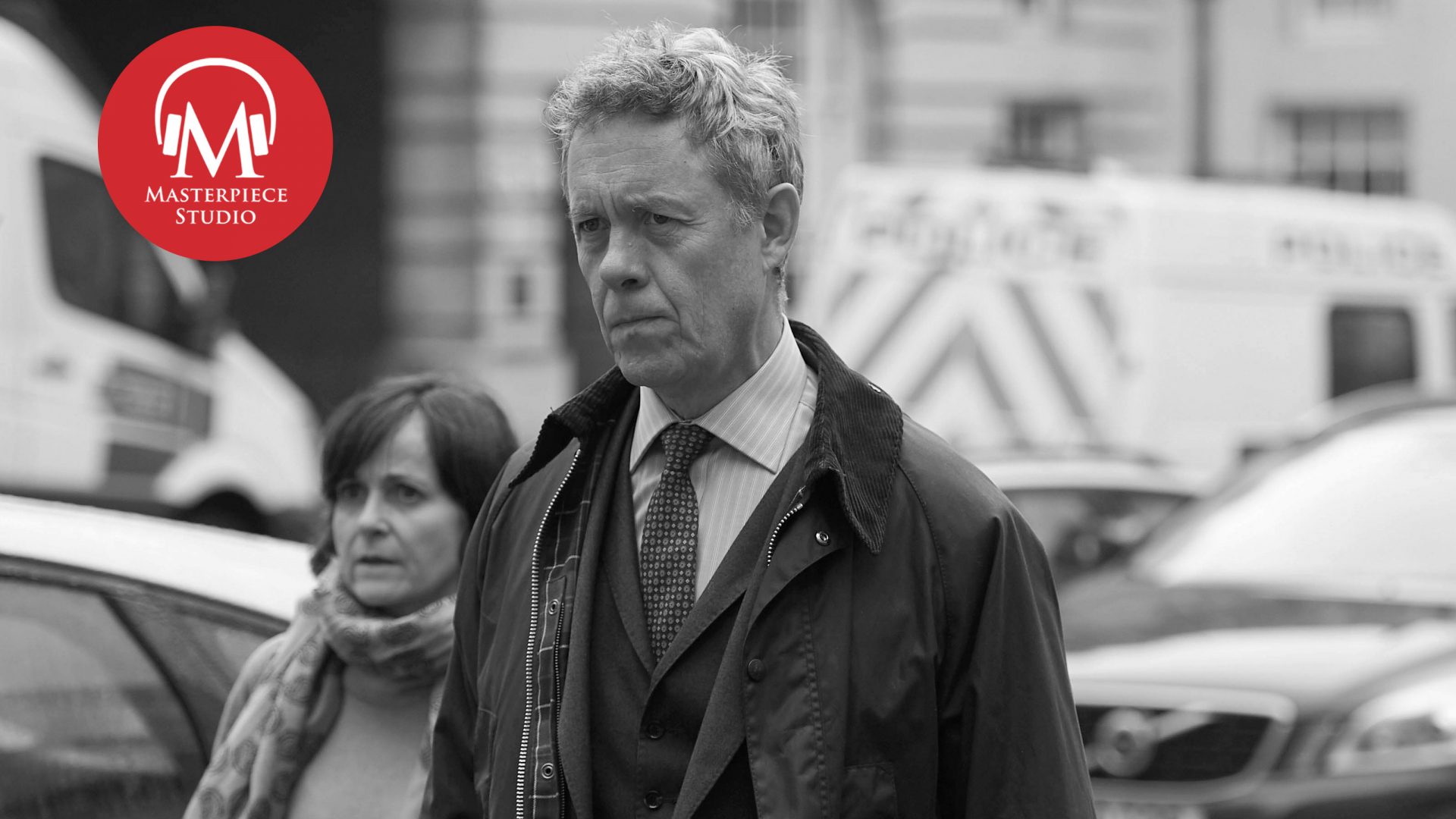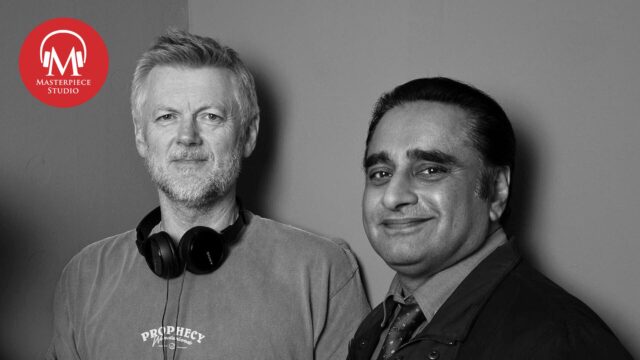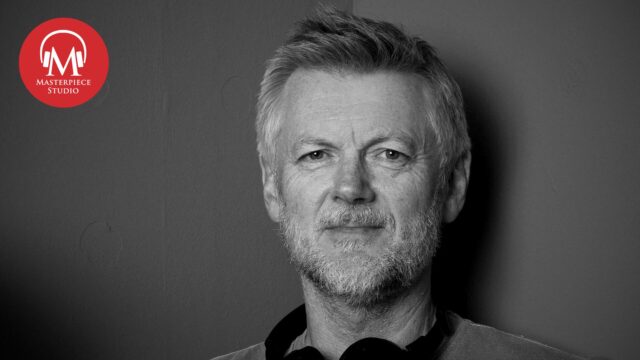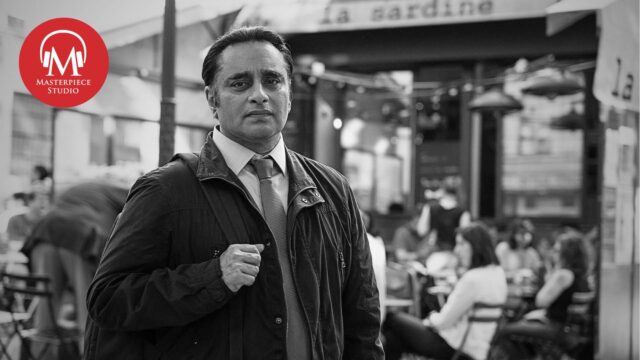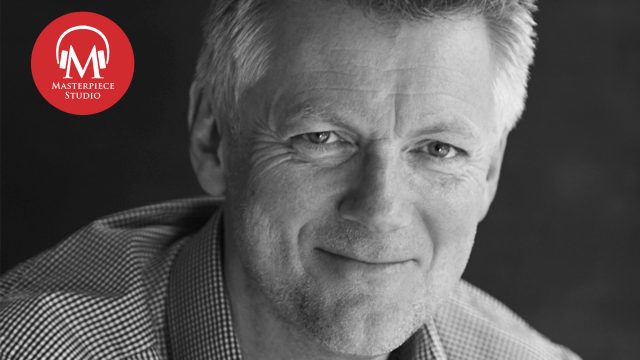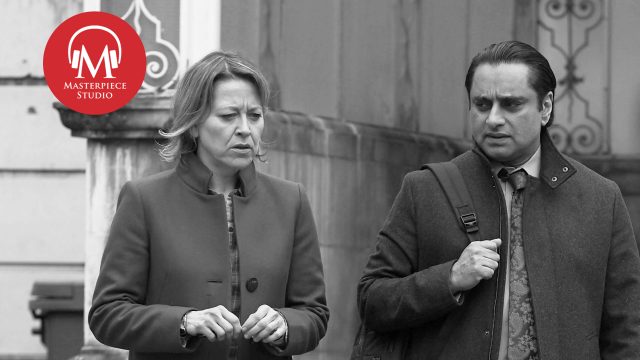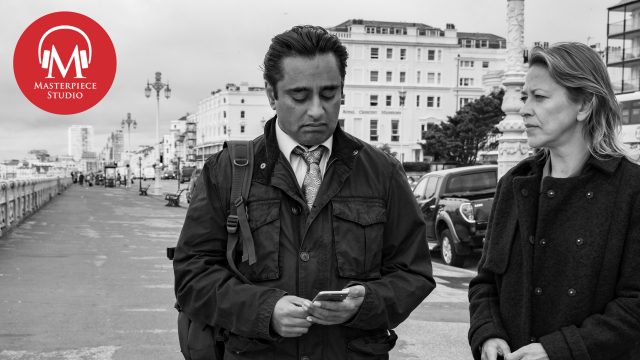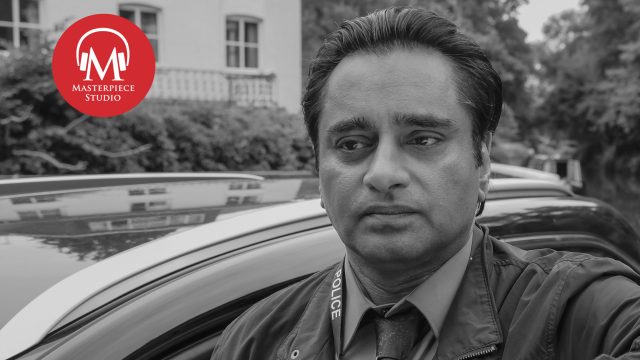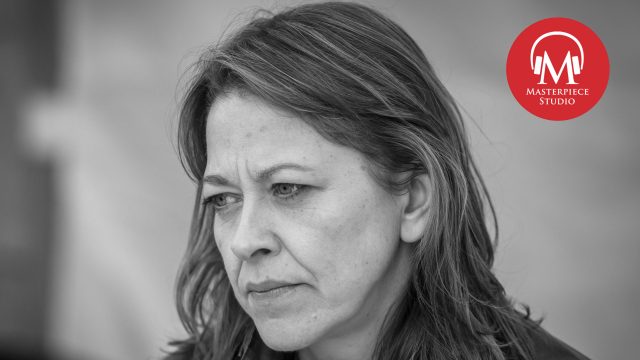Spoiler Alert: If you have not watched the third season finale of Unforgotten, stop now and go watch it before listening to this podcast.
Jace Lacob: I’m Jace Lacob, and you’re listening to MASTERPIECE Studio.
It’s happened again — DCI Cassie Stuart and DI Sunny Khan have solved an impossible crime, cracking the cold case of Hayley Reid, convincing her killer, Dr. Tim Finch, to reveal all he knows, including the shocking confession that he not only killed Hayley, but is in fact a serial rapist and murderer.
CLIP
Tim: Obviously I killed them to protect myself. I’d raped them, and unless I killed them, they were going to report me and I was going to go to prison…
Jace: Dr. Finch admits to the slaying of at least three young women, and ominously suggests he’s killed many, many more, burying their remains throughout the idyllic British countryside. It’s a revelation that propels a distraught Cassie off the force, and leaves Finch doling out breadcrumbs about his other victims to Sunny and Lingley.
CLIP
Tim: Tewkam Wold, it’s a village south of Lincoln. Her name was Victoria.
Jace: Actor Alex Jennings, better known to MASTERPIECE viewers for his role as the suave King Leopold of Belgium on Victoria gives Tim a placid, almost pleasing mask to hide his monstrous nature. It’s Jennings’ static, icy delivery that lends the reprehensible doctor and killer an extra unsettling layer.
Alex Jennings: All of it’s about control, I think, and therefore some power. Who knows how many people he has killed. He can keep dropping these little presents to them.
Jace: Jennings joins us again on the podcast to discuss how it feels to play an out and out bad guy, one whose killing of Hayley Reid was merely the tip of a murderous iceberg.
Jace: And we are joined this week by Unforgotten star, Alex Jennings, welcome.
Alex: Thank you for having me.
Jace: Coming off of Victoria and The Crown, what was the appeal of playing Tim Finch on Unforgotten?
Alex: Unforgotten, I’d worked with the director before, Andy Wilson, who is an amazing director. I read the scripts. I was surprised that they wanted me to play it, but I thought I could, and I went in and I met the writer and the producers and they thought I could as well. And it was a fantastic opportunity for me, I think. For a start, to be wearing contemporary costume, which I don’t very often but just to not to be worried about historical research and being trussed up in Victorian costumes, or worrying about being believable as the Duke of Windsor, I could invent this person. And work out how to not give any clues and give anything away as the story unfolds.
Jace: At what point during the production did you learn that Tim Finch was not only the season’s killer, but a sociopath, a rapist and a serial murderer, who had killed dozens of women? Did you know that going in?
Alex: Yes, I did, because I’d read all six episodes.
Jace: I mean, how did having that knowledge in advance help shape the character in your portrayal? Did it help as an actor, in terms of keeping Tim’s mask firmly in place?
Alex: He had to keep it, he had no choice but to keep it firmly in place and that was in a way part of the game he was playing. It was quite a horrible place to go to, really. I mean, I loved the job and working with the people I worked with. But he wasn’t a very nice person to sort of have in your head, really. But you can’t give anything away as the structure of that series is written. There’s a series here called Broadchurch, where I gather that none of the cast knew who had done it, even the person who had done it, while they were filming it. So obviously that’s going to be a very different process. I just had to keep a lid on things, really.
Jace: I mean the reveal itself is, I’d say, utterly chilling.
CLIP
Cassie: Just to be clear here Tim, are you admitting you did kill them? Both of them?
Tim: I am. And if we can do this properly, if we can do this with respect, if we can avoid turning it all in to some sort of sordid circus, I’ll tell you where the others are buried too.
Jace: What did you make of that reveal?
Alex: He knew the game was up and that they had enough on him and he was grasping at keeping a little bit more power for as long as he could. That he was in control still of that information. So it gave him, you know it was like a lost last roll of the dice and…yeah, awful, horrible.
Jace: I mean, it’s sort of a contrast to the first time we see Dr Tim Finch, where he’s tending to a patient who lost his wife two months earlier. There’s this incredible tenderness and sense of compassion that he’s sort of giving off. I mean. is this part of the the sort of the mask to hide his true monstrous nature?
Alex: I think it is part of the mask, but I also think that he’s not going to be displaying psychopathic behavior and tendencies to everybody he meets. He’s able to at least pretend, as he says, in episode six, he’s able to pretend that he cares. But he has to be convincing in that pretense, because nobody suspects.
Jace: Though the anger does spill out at certain points.
Alex: Yeah.
Jace: There’s the anniversary dinner scene, in episode one, where he lashes out at the server about the wine being corked.
CLIP
Tim This is corked.
Waitress: Is it? Right, so sorry about that, let me just..
Tim: No, no, no. You don’t need to smell it. I smelt it. It’s corked.
Waitress: I’ll bring you another bottle.
Jace: And there is this sort of shimmer of true anger. His family sits there almost holding their breath. What direction did you receive for that scene?
Alex: Andy was always telling me to hold back, to not give too much away. And you are aware, because the series is so, the writing is so cleverly constructed that Chris Lang will toss those things that make you uncomfortable or make you feel that’s what’s interesting about that character. And then the next few scenes he will be telling somebody else’s story and he might drop things that make you feel suspicious about somebody else. It’s very cleverly written and I hadn’t seen the two previous series before I was asked to do this. I just had and watched them and then did, and you know I was thrilled to be a part of it because I think it’s an amazing series and series one, particularly was stuffed with amazing actors giving amazing performances. Tom Courtney and Hannah Gordon and Bernard Hill. Wonderful, wonderful actors being brilliant in it.
Jace: Oh it is I think an embarrassment of riches. This show, with its casting, it’s incredible. When Tim is ready to confess to the murders he asks for a cup of tea and the understanding that it won’t turn into a sordid circus. You touched on sort of respect. But why is the notion of respect so important to him at this point when he’s been captured?
Alex: I think him asking to be treated with respect is also tied into his him continuing to try and wield some kind of power. And wanting, demanding that they treat him with respect is is an attempt to still have however little, but some control.
Jace: ‘I’m pretty much a textbook psychopath,’ says Tim. ‘Above average intelligence, superficially charming, zero empathy.’ Silence Of The Lambs is referenced by Sunny, but your performance is so completely modulated. Was there any discussion about Hannibal Lecter in terms of setting the tone?
Alex: No, there wasn’t. There may have been a take where I did a bit of fava bean acting. But you know, God. It was, you know, one of my heroes and one of the greatest performances ever was Anthony Hopkins. No, we didn’t really talk about it. We didn’t really talk about it. That was kind of Sunny’s take on it.
Jace: I mean the way Tim cooly shares facts about death from strangulation is horrific. It is as though he has ice in his veins. How much of a challenge was it to shoot these interrogation room scenes?
Alex: It was incredibly concentrated. Nicola and Sanjeev are just fantastic to work with. And we had nice times together between scenes. But it was very, very concentrated. And the atmosphere on set was very similarly so and Andy would be there just after you’d done a particular take just throwing in a sort of little word or a suggestion very quietly for you to think about the next time you did a take. And we got to do it broken up but we got to film long segments as well which can be unusual when you’re filming. I was kind of glad to get rid of it in a way to after those couple of days. Oh and as well the schedule and they’ve done this every time on Unforgotten was constructed so that the interrogation scenes come at the end of shooting.
Jace: Really?
Alex: Yeah, yeah. Which was a big help.
Jace: So then you can sort of emotionally sort of build up to that?
Alex: Yeah yeah exactly. And it’s you know it’s a lot of words just practically to get your head around, but you’ve told the rest of your story. They were absolutely the last things I filmed, which I was very grateful for.
Jace: Before this next question, a brief word from our sponsors…
Jace: Nicola Walker’s Cassie becomes increasingly uncomfortable during these scenes, as she and Sunny get Tim to give up details about the murders. Is Tim deliberately provoking her? Is he pushing her?
Alex: He is deliberately pushing her, and he is fascinated by the effect it’s having on her.
Jace: I mean, I love how he says, quote, ‘Really, the most important people here are the victims.’ How did you read that moment? Is he at all aware of the irony? Given that they’re only victims because of him?
Alex: Yeah, I think he is aware of the irony, but he’s not going to play the irony in a way.
Jace: I mean, that that that small line, I think, gave me insight into his entire character. It’s just such a creepy, weird thing to say.
Alex: I don’t know what can I tell you? I didn’t write it.
Jace: So you can blame Chris Lang. Is there relief or pleasure for Tim in finally being caught?
Alex: I think there’s a bit of relief that it’s all over. In a way. That he’s not somebody who is I don’t think he’s going to have a breakdown about it.
Jace: I mean, how much of Tim’s personality is about control? Looking at sort of that episode one freak out about the wine being corked, the murders and his victims, and now sort of doling out these bits of information to the police. Is it about control, more than even power?
Alex: All of it’s about control, and therefore some power. That he can he can keep, who knows how many people he has killed? He can keep dropping these these little presents to them. So he’s wielding control and power.
Jace: I think, I mean the scene on the hill, when the police uncovered Natasha’s body, says a lot about both Tim and Cassie. It’s the moment where she opts to walk away from the police force. Why do you feel Tim Finch’s actions are such a breaking point for her character?
Alex: I think it’s been building up during previous series, as well, of what she’s having to, what she’s having to deal with and the emotional impact it’s having on her and her life to be so knee-deep in in all this filth. And one of the crewmembers actually on Victoria had seen it, and his wife is a police woman. And I was able to tell Nicola this, she was very upset by Unforgotten and the toll that we see the work taking on Cassie and said how accurate it was, you know, obviously not for every person working a homicide, but she totally empathized and believed and recognized the effect it was having on Cassie, and thought that was very truthful.
Jace: I mean, until now, Unforgotten had centered around very different murders. Crimes of either passion or revenge. Tim Finch is certainly a departure from that mode of storytelling. What do you ultimately make of the character is he the face of true relentless evil?
Alex: Yeah I guess he is. I guess he is. And he offers no excuses. Says, ‘Yeah my dad was controlling, but my sister’s perfectly all right.’ Textbook psychopath.
Jace: I mean he does reject this sort of nature versus nurture implications of this, that there wasn’t necessarily some formative event that locked him into this. But we also can’t discount any of these things, he isn’t necessarily truthful. It does ask the question of where evil comes from, and why this man is ultimately so relentlessly evil?
Alex: He’s not going to give anybody the benefit of exposing any vulnerability or finding excuses, or he’s looked into that, and he has chosen to reject it.
Jace: In the three months later epilogue, a rather sallow looking Tim asks Sunny for new books in exchange for information about his other victims, threatening to go to the press if they don’t give him what he wants but they call his bluff. Is this the true face of Tim Finch, a sad powerless little man?
Alex: Yeah it is, now. Yes, and that’s maybe what he always was and the relationship, his relationship with the two wives is very interesting, I think, and how much Amanda Root’s character, the second wife, is a victim as well of his quiet manipulation. You know, not a happy house.
Jace: No, no. How difficult was it not to bring this character home with you at the end of the day of shooting?
Alex: Well my wife said, ‘You didn’t show.’ I didn’t really notice, I mean it was, as I’ve said, it was very kind of calm. It was a very concentrated thing to be involved in and not something that I’ve visited before dramatically, really. She said that, ‘You didn’t like being him, did you?’ No, no, I didn’t. But it was, you know, it’s fascinating to have a go at that, it really was.
Jace: And then you were happy to sort of move past it?
Alex: Yeah, yeah, yeah.
Jace: Looking back at the season, do you have a favorite scene from the third season of Unforgotten?
Alex: Well, it was doing the interrogation scenes with Nicola and Sanjeev.
CLIP
Tim: And for what it’s worth, although death from strangulation can take up to two to three minutes, unconsciousness comes in as little as ten seconds, certainly no more than twenty, so there was very little pain. Same with Alison. Please do reassure their families about that.
Sunny: Was she your first, Alison Baldwin?
Tim: So I intend to treat you with respect, I hope you’ll afford me the same consideration, but really, the most important people here, are the victims.
Alex: And the intensity of that and the trust you put in the other actors and trying to imaginatively be in the moment and listening and responding and yeah, that was the most satisfying for me.
Jace: Alex Jennings, thank you so very much.
Alex: Thank you.
Jace: Coming up next on MASTERPIECE Studio, actors Dominic West and David Oyelowo and writer Andrew Davies return to the podcast to break down the heartbreaking final installment of Les Misérables.
CLIP
Cosette: Papa, your hands, they’re so cold.
Valjean: That’s because I’m going to die soon.
Jace: Following the conclusion of Les Misérables, look for more Mystery! on MASTERPIECE, with new episodes of Endeavour, and later Grantchester, arriving on your screens starting June 16.
And on June 23, Endeavour star and sometimes series director Shaun Evans joins us to explore what it means to play a role on both sides of the screen in Endeavour Morse’s Oxford.
MASTERPIECE Studio is hosted by me, Jace Lacob and produced by Nick Andersen. Elisheba Ittoop is our editor. Susanne Simpson is our executive producer. The executive producer of MASTERPIECE is Rebecca Eaton.








